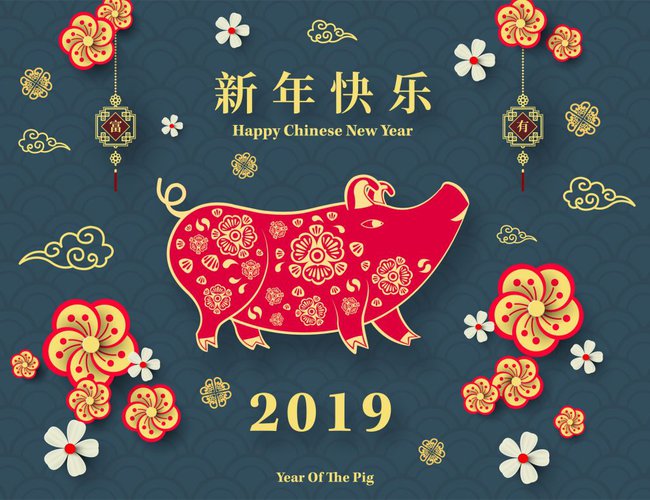
World’s largest population seems to be pacing against time – hopping one month in a year to gear up for the upcoming “Spring” festival. In Chinese lingua, spring festival is called "Chunjie". And to celebrate and commemorate this auspicious festive mood, Chinese citizens living abroad have booked their tickets back home from all over the world.
This festival depends on the lunar calendar. Chinese follow lunar calendar And each year is dedicated or named after 12 holy and revered animals as per Chinese traditions and this is the year of Pig, it starts on 5th of February, 2019.
Legend or general belief on how it began goes like this: In ancient China, there was a Kingdom, where people were terrified by a monster. Once in a year the monster used to come to villages, eat people and animals and destroy their farms. The people were unable to resist him.
But one day, when the monster tried to enter a certain village, a little known old man arrived from no where , and began displaying red lamps towards the monster and began throwing crackers at him. The monster got frightened and could not venture advancing towards the village boundary. Excited and surprised, the villagers came out of their houses and joined the old man. The monster ran away, never to be seen again in the villages.
People came to know that the monster was afraid of three things – Red Couplets, Firecrackers, and Household lighting. The day called for celebration and that was the first day of the year, and also the beginning of the Lunar New Year.. "Chunjie" ever since has come to be regarded as the most important festival in China. Chinese people get a week off as a public holiday for “Chunjie” celebration. Locals say that the event used to be celebrated at least for a fortnight earlier, however, with people having to engage in economic production , they have cut down on the celebration.
Chinese people have a small family unit, having not more than six in their three generations. And the spring festival unites most of them together, no matter whether they live within the country or abroad, in jobs or studies People clean their house and paste red Couplets in the wall and windows. Bright and colored new year paintings has auspicious meanings. The Chinese character “Fu” means "blessing and happiness" and hence it is pasted upside down . In the Chinese language, the ‘reversed Fu’ is homophonic with "Fu" and when pronounced both together it is called as “Fu- Dao- Le”. Two big lanterns are hung on two sides of the front door of the house. In the day of "Chunjie", the Chinese people , in their greetings. Wish or "Welcome peace and abundance" to all. It is a very important day for the old aged members and their ancestors. Younger family members come with gifts for older people and in the memories of their dead ancestor’s they burn artificial Chinese currency. A younger member of the family gets “Hongbao” , a red envelop with some Chinese currency.
Spring festival eve is important for all family members. as they reunite after a long time and eat dinner in the same dining table. On the day of the festival, lots of traditional and delicious foods are prepared by the daughter in laws and grandchildren and are served in the dining table. Especially dishes such as chicken (Ji), fish (Yu), and bean curd (Doufu) are not only the most sought after and important, but these are the dishes that should not be excluded. In the Chinese language, the meaning of Ji, Yu, and Doufu are "auspiciousness", "abundance", and "richness". After dinner, all the family members sit together and share their year-long experiences with each other and get suggestions from the older family members on future journey of life. Now with the advent of the digital world, the people watch spring festival party digitally and meanwhile the younger generations go out to see the flying lamps and colorful crackers in the sky. Nevertheless, China wears a festive mood and there is celebration everywhere.
(The author is a student of Chinese language and Culture at Heibei University of Business and Economic)

Abhilasha Sharma
Sharma can be reached at abhilasha.peace@gmail.com
- Obituary: Hari Sharan Nepali ‘Kaji’
- May 21, 2021
- Woes of Bus Conductors
- Sep 03, 2017
- HOPE IN DESPAIR: Fighting and Surviving Cancer
- Aug 17, 2017
- Three Days In Delhi
- Aug 14, 2017















